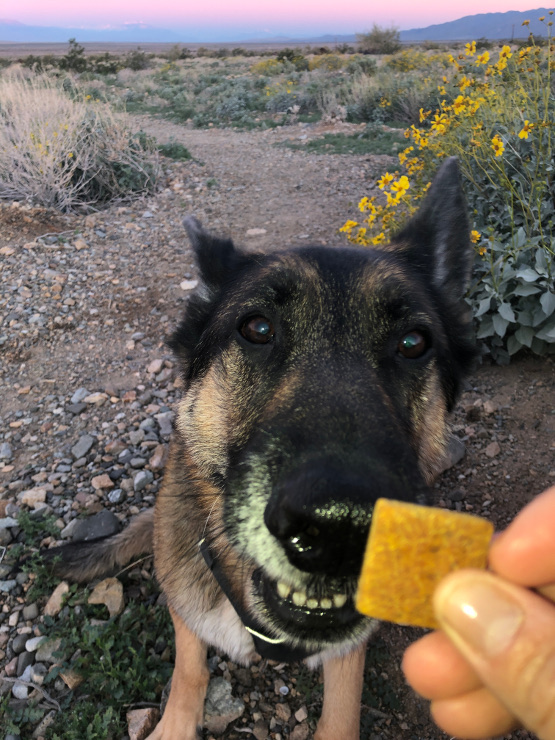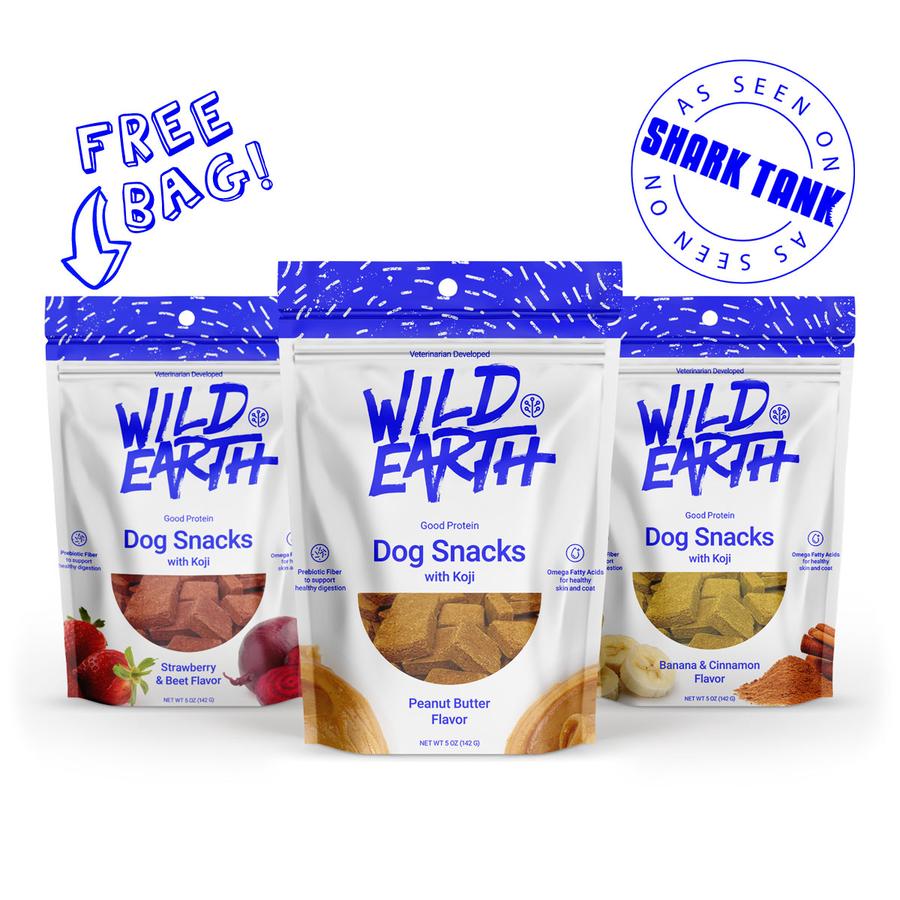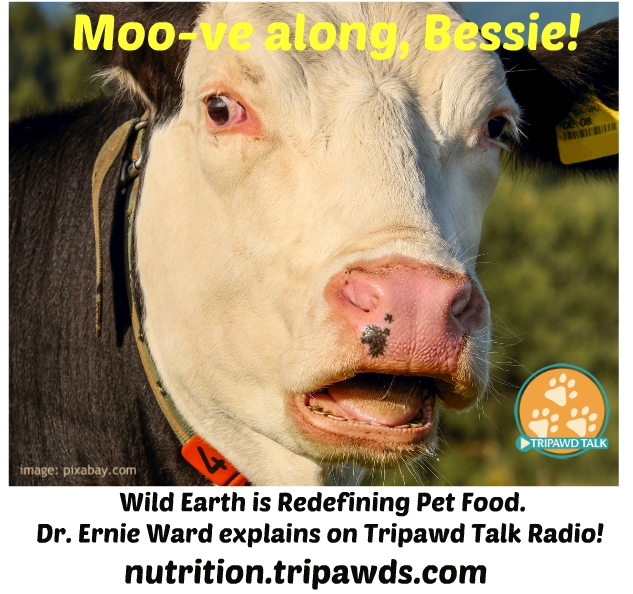Vegan dog food doesn’t contain animal meat, but just because Wild Earth pet food is meat-free, please don’t call it vegan. Confused? Then tune in to Tripawd Talk Radio to learn how Wild Earth is going beyond the vegan dog food label, with the company’s Chief Veterinary Officer and pet obesity prevention guru Dr. Ernie Ward.

Wild Earth Goes Beyond the “Vegan Dog Food” Controversy
Let’s get real. Conventional pet food is a major contributor to greenhouse gas emissions and climate change. Almost 30% of the environmental impacts from animal production is a direct result of our pet food purchases, including one third of greenhouse gas emissions!
Simply put, pet food that contains poultry, beef, pork or fish is contributing to climate change and the destruction of the environment. Wild Earth is giving us another way to feed our pets without harming the planet.
By creating recipes built with sustainable fungi-based nutrients, the company’s cruelty-free treats (and soon, pet food) does not contribute to environmental destruction. Wild Earth also boasts the highest animal-free protein diet ever created, along with a unique fiber to help with gut health and obesity prevention.
Wild Earth is so promising that the company received $550,000 from Shark Tank venture capitalist Mark Cuban!
Why Fungus-Based Nutrients Are Better Than Animal Meat
Instead of relying on an animal meat protein source, Wild Earth recipes are based on an ancient fungus called “Koji,” which contains all ten essential amino acids that dogs need to thrive.
“Koji has almost twice the protein density of cow steak!” says the lifelong vegetarian and active triathelete, Dr. Ward. But don’t let the word “fungus” scare you. Asians have been eating it for thousands of years after discovering it in the rice cultivation process.
Koji is the distinct “umame” flavor that gives zing to soy sauce, sake, miso or bean paste among other Asian foods.

Koji (and other bacterial-based proteins the company is researching) is far less expensive to produce than any traditionally farmed plant, or even manufacturing cellular-based proteins (i.e., lab-grown meats). The nutrient profile proves that animal meat is not necessary for our dogs’ health.
“There’s no magic to a dead cow,” says Dr. Ward. “Once you take a bite of that chicken breast, your body doesn’t really care where that protein originates. It breaks down instantly into the amino acid building blocks. Our bodies are agnostic when it comes to these protein sources,” he says.
The lack of resources it takes to grow Koji can help mitigate the effects of climate change. “It takes four to six years to grow a cow,” says Dr. Ward. “But only 72 hours for to grow fully formed fungal proteins!”
The end result is a diet that America’s godfather of pet obesity prevention has only dreamed about. Wild Earth is a high protein, high fiber diet that provides all the amino acids, vitamins and nutrients pets need for an ideal, lean weight. As a bonus, it’s produced in a more sustainable and environmentally friendly and cruelty-free way.

It’s About Pet Food Nutrients, Not Ingredients
Do the research on Wild Earth and you’ll see that Wild Earth gives pets what they need to thrive. Once we toss the vegan ideology aside and get down to basic nutrients for good health, Dr. Ward and his colleagues are changing the pet food industry by leaving chickens, cows, pigs and fish out of the equation.
If you want to be part of the solution to environmental destruction, not part of the problem, look for Wild Earth’s treats online and in better pet food stores. Their dog food is coming this fall, and a “clean mouse meat” cat food will appear in the near future.

Dear Jerry,
I apologize, but I am confused by your opening sentence: “Vegan dog food doesn’t contain animal meat, but just because Wild Earth pet food is meat-free, please don’t call it vegan.” I did read the rest of your article and listen to the embedded audio recording but am still unclear.
Respectfully, I just want to be clear: do all of the pet food and snack products of “Wild Earth” meet the ethical standards of vegans?
Thank you,
— Thom Malone
Hi Thom. Technically, yes, it is a meat-free vegan dog food. But as Dr. Ward mentioned in our podcast, the word “vegan” has all sorts of emotional and political connotations surrounding it. Instead, Wild Earth is asking people to leave the word out of the conversation when discussing the benefits of utilizing a protein source in pet food that doesn’t come from animal meat. Hope that makes sense.
I’ve been using Wild Earth and my dog really loves it. However, I just had some labs done on him for his severe allergy reactions the last few months. He is allergic to local trees, many grasses, and various other things, but excessively highly allergic to storage and dust mites, which are often in dry dog foods. Are there grains in Wild Earth that might attract these mites?
I may have to change his diet as I don’t want to continue using steroids, which is the only thing that brought him relief after having his stomach area terribly inflamed from his allergens.
Hi Serena. I’m so glad you’re giving Wild Earth a try. About the closest thing to a grain that Wild Earth has in it is wheat germ. I’m not sure if that qualifies as a true wheat grain though, so you may want to check with them. They have terrific customer support!
i have 9, 7 , and 6 year old afghan hounds. ( one yorkie) Ive been feeding dry dog food with: organic quinoa with black bean and a super food green diet. been feeding them Victor. my hound has elevated live enzyme they say maybe from too much protein…going to change foo. do not want to die them animal products. looking for comparative analysis for my pups.
MY one hound has arthritis in his left and shoulder.. don’t want to medicate his whole body but IF there is something really proven true ( holistic) I will use it. thank you
We have found the best dog food analysis, ratings and reviews at dogfoodadvisor.com. For more info, check out our various articles and podcast episodes discussing Dog Food Advisor.
From personal experience Afghan hounds are endearing though stubbon and do not take to a vegan diet.I read all the sight hound hunting breeds are best avoided if the owner wishes to feed a vegan diet. The border collie does well on a vegan diet. Vegan dogs are inclined to eat their own faeces and particularly strive to eat discarded macdonalds and chicken fast foods, indicating that naybe dogs are not an ideal fit for vegans who do not buy animal products. A vegan fifty years I miss the company of dogs I sometimes wonder at the wisdom of dogs joining our distant forefathers by the campfire and becoming part of our tribe 🙂
My dogs just don’t like it I have to put something on it for them to even try it it and most of it ends up on the floor. I was really hoping they would but that just isn’t happening so I’m canceling because no point in having it if they don’t like it. I made a point to slowly introduce it to them but they avoid eating it when they can
Oh what a bummer Jeanele! Sounds like you did all the right things to introduce it. How long did you try? Just curious.
Is this dogfood good for diabetic dogs?
Shari that is a great question. I didn’t see the answer on the Wild Earth website so I would reach out to them. Then let us know what they say, it would be helpful for us to know the answer.